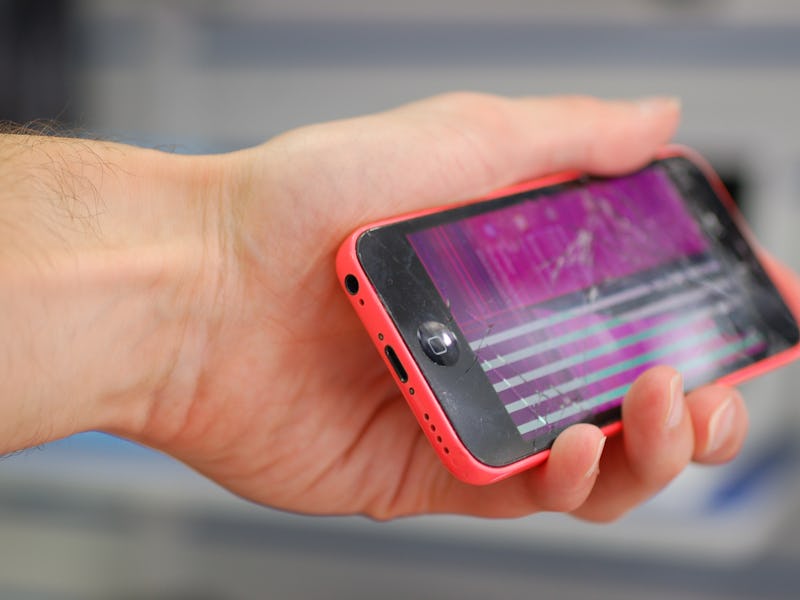Here's the iOS Software License That the Government Will Breach
… and, unfortunately, why Apple's hands remain tied.

In the ever-dramatic San Bernardino Apple vs. FBI case, we’ve seen it all. Court orders issued, ancient acts invoked. Apple — along with U.S. citizens, transitively — continues to be trammeled by its own government.
This week, the government announced that it had possibly found an “outside party” that could break into the shooter’s work iPhone. (You hopefully don’t need reminding that this public skirmish is really about precedent and that the chances that this iPhone’s data matters to national security are low.) Rumors swirled that it was Israeli-based firm Cellebrite, a firm that routinely assists the government with gathering devices’ data, but those rumors have since — to some degree, at least — petered out.
This week, John McAfee told Inverse that “if Apple has any decent response at all, they will sue the U.S. government. Because basically what it involves is hacking Apple’s iOS.” Which got us thinking: is there anything within the iOS Software License Agreement that explicitly rules out what the government’s outside party may accomplish? And gee willikers — is there ever.
The Software License Agreement for iOS 9, the iOS that is installed on the relevant phone, includes a section that just about verbatim prohibits what the government’s outside party will do. Here it is:
(d) You may not, and you agree not to or enable others to, copy (except as expressly permitted by this License), decompile, reverse engineer, disassemble, attempt to derive the source code of, decrypt, modify, or create derivative works of the iOS Software or any services provided by the iOS Software or any part thereof (except as and only to the extent any foregoing restriction is prohibited by applicable law or by licensing terms governing use of open-source components that may be included with the iOS Software).
And if you, like the government and its outside party, would rather not, Apple kindly suggests that you make like a tree.
… YOU ARE AGREEING TO BE BOUND BY THE TERMS OF THIS LICENSE. IF YOU DO NOT AGREE TO THE TERMS OF THIS LICENSE, DO NOT USE THE iOS DEVICE OR DOWNLOAD THE SOFTWARE UPDATE.
Unfortunately, contra McAfee, it’s not exactly sensible for Apple to take either the government or the outside party to court on this basis. Inverse spoke with Portland-based intellectual property, business law, and litigation lawyer Kohel Haver to double check.
Haver began with a fair disclaimer: “I’d have to sit down and really look at the whole thing. I’d have to read the whole thing to give a useful opinion about whether or not this violates their agreement, and whether that matters.
“If you’re using it to invade people’s privacy, then we have privacy laws that are going to step into play,” Haver said. “If you’re using it for law enforcement, law enforcement rules should be able to, uh — I don’t want to use the ‘T’ word — uh, overrule those privacy rules. If it’s to save somebody’s life, and they have the evidence of that, then that should be okay.”
Haver’s final point, though, puts the nail in the coffin for Apple’s litigative dreams. (And, perhaps, McAfee’s, depending on what precisely McAfee has in mind.)
“I don’t think they would ever want it to get to a trial, because if it becomes a trial where that’s the subject matter, then they’re going to have to prove how somebody got into it and what they did. And you never want that to be in evidence. It becomes way more public.
“We start where the first premise is, We want to keep this secret. And if law enforcement wants to get around it for their purposes, for their fantasies, then they can — but they can anyway. They’re already doing that. They don’t ask Apple, ‘Hey, can we?’ No, they’re thinking they’re saving lives, doing their job. So they do whatever they can do. Without asking.
“If it were really true that the federal government needed to break into an iPhone, they would not use a public court. For national security? They would use the FISA court. And this would be done behind closed doors, and nobody would know, and it would be over.
“I thought this was a clumsy publicity stunt.”